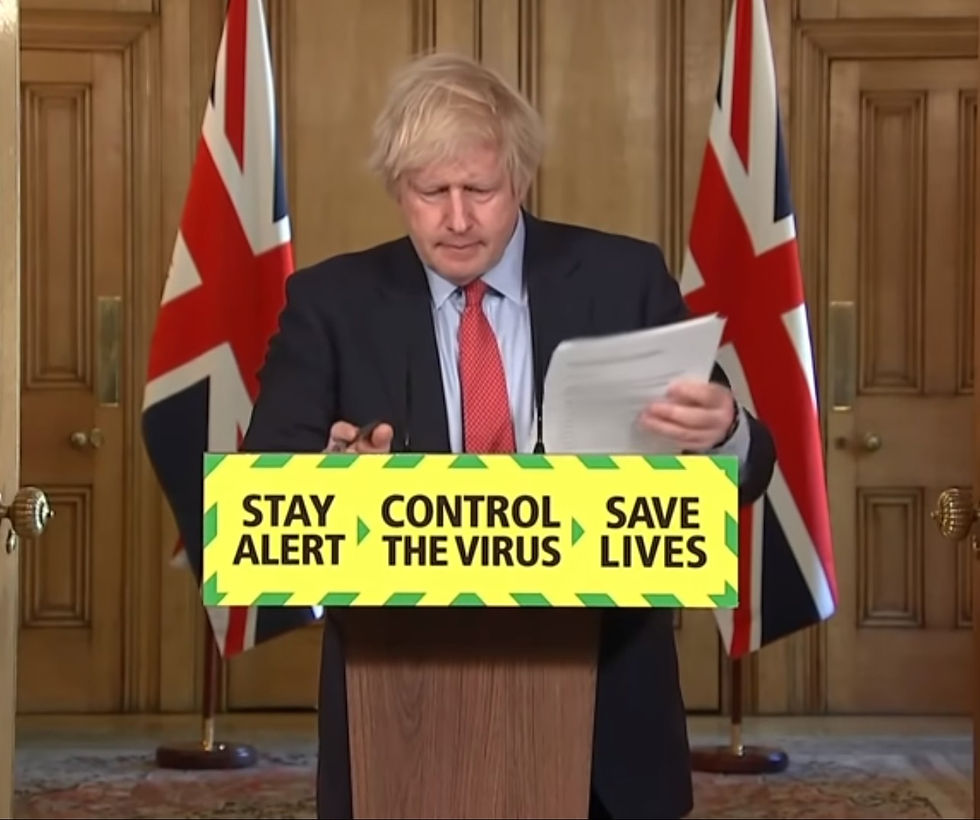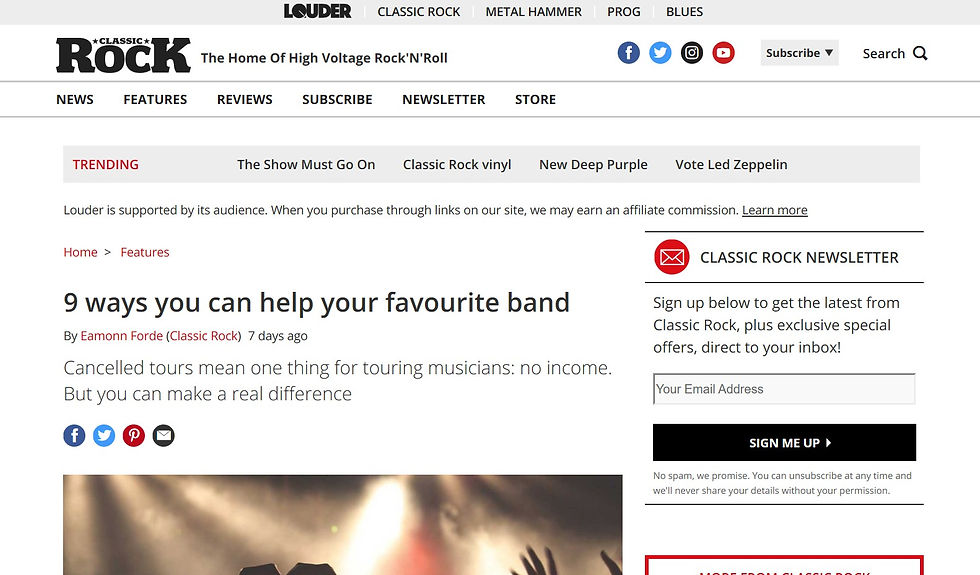An unprecedented situation
- garethsprogblog
- Mar 25, 2020
- 7 min read

PM Boris Johnson at a daily Coronavirus briefing (screenshot from BBC TV)
Everyday service has been increasingly more abnormal since at least 2016 and probably since 2008. The UK’s EU referendum result might have seemed like a bolt from the blue but the shockwaves from the global financial meltdown, especially the austerity measures introduced by the new government in 2010 where the wrong demographic was punished for the shortcomings of capitalism, presaged the conditions necessary for the descent into irrationality and self-harm. The decline really began long before the 21st century when the influence of large corporations, becoming multinationals during a period of rapid globalisation that showed no signs of aversion to the exploitation of the mineral wealth or workforce of developing countries, embarked on schemes to protect their own value at the expense of the general population, democracy and the natural environment.
The power and behaviour of vested interests has eroded the mechanisms of world governments to the extent that we’re unable to respond appropriately to the current coronavirus crisis. Poor animal husbandry and unregulated exotic live meat markets facilitated the rise of a novel zoonosis; early reports of a new viral respiratory disease in China were suppressed and medical staff branded ‘enemies of the State’; the near-universal use of smartphones, implicated in a pandemic for the first time, acted as an ideal vector for spreading Covid-19; the connectivity of people, a benefit of globalisation, allowed the virus to spread as tourism and business continued as normal; vehicle and industrial pollutants responsible for inflammation of the respiratory tract exacerbated the severity of the disease; and in the UK, where 10 years of deliberate underfunding and deconstruction of the NHS has left staff shortages in every department, we are saddled with a Prime Minister unwilling to restrict the freedom of movement of its citizens, a PM whose initial policy acknowledged that Covid-19 would kill off the elderly as the rest of the population gained herd-immunity. However, it’s important to point out that no single country is to blame for the rise and spread of Covid-19, it’s a failure of (poor) regulation and standards.
I have to admit that when the disease first appeared in China, I was sceptical of its severity and perhaps foolhardily, I was skiing in Sauze d’Oulx, an hour away from Turin, while a number of provinces in neighbouring Lombardy were under lockdown. Coronavirus is common and anyone with only mild symptoms caused by Covid-19 could have been given a degree of immunity to the new strain because they’ve been previously exposed to other coronavirus. The rapid global spread and the mounting death toll in Italy, the epicentre outside of Wuhan, exposed a worldwide lack of preparation for a new pandemic, and that’s what changed my mind.

Though banning concerts, viewings at the cinema, spectator sports and other forms of human congregation will save some lives the cost, quite justifiably, is a restriction on our normal behaviour. What’s unacceptable is that any shutdown should result in a loss of income for workers and while some countries have agreed packages that will ensure no individual suffers from hardship during the crisis, the UK government has only just begun to address the very real concerns of millions of self-employed, those on zero hour contracts, anyone that doesn’t fall under the key worker banner, and those in rented accommodation but there’s no money available until June and it’s impossible to access the site for the derisory Universal Credit. Many musicians fall into this category, as do others working in the industry such as road crew and studio technicians.
Within the first ten days of a coronavirus impact survey of its 32000 members by the Musicians’ Union, it was estimated that musicians in the UK have already lost over £20m in earnings. Over 4000 responded to the survey with 90% saying their income had already been affected by social distancing rules, the closure of live venues and school closures, because many musicians make at least part of their income through teaching. The union announced that a new hardship fund would be set up to pay grants of £200 to out-of-work musicians to provide a small amount of relief to its members, adding that the government needed to provide urgent clarity on what wider support would be available, and called on the record industry to also play its part.

The first response I saw to the disruption to the livelihoods of musicians was an online article by Eamonn Forde (from Classic Rock) on the Louder website, 9 ways you can help your favourite band https://www.loudersound.com/features/your-favourite-band-and-how-you-can-help?fbclid=IwAR0J5usu-hPlWsgbaFJ5XePLllCCGkgmC31pPYYJ0uELKNYGnPSSJX96SGc which neatly sets out the rationale behind some very supportive actions you can take to help secure the future of music.

In the last two years I’ve been to 46 gigs, some of them featured bands in the prog’s premier league but many more were smaller or less successful acts. I tend to buy a tour programme when I go to see one of the really big groups but I’m more inclined to visit the merchandise stand for music, on vinyl if possible (recent purchases include The Lighthouse by Iamthemorning, and No Fear of Looking Down by Jadis, for instance) but I’m not unhappy to indulge in a CD or DVD (The Lifesigns debut album and Live in London - Under the Bridge, More Than Meets the Eye by Jadis, Cellar Noise’s second album Nautilus, the first three Hats Off Gentlemen it’s Adequate releases, Invisible, When the Kill Code Fails, and Broken but Still Standing, Metamorphosis by Hamnesia.) I prefer to buy music direct from the artists and if it’s not available at gigs or there are no upcoming shows, the band’s own website invariably includes merchandise or redirects you an appropriate site like CD Baby. I got my (vinyl) copy of Exegi Monumentum Aere Perennius by The Rome Pro(g)ject direct from Vincenzo Ricca’s The Rome Pro(g)ject site and got The Water Road on CD and an LP version of The Clockwork Universe by Thieves’ Kitchen from The Merch Desk via the band’s homepage. If you like a band, it’s sensible to sign up to their notifications. You’ll get advanced notice of upcoming performances (when they eventually resume) and of forthcoming releases. While there is often no problem obtaining tickets for some of the gigs I attend – I’ve been in an audience of about 10, the other nine being musician friends of the band for one concert in the rather splendid Teatro Altrove in Genova where I thought it was such a culturally significant event I’d have to pre-book my ticket to ensure my place – any special edition or limited release means you’re less likely to miss out if you’ve signed up to a mailing list. A 2019 Facebook post, shortly after I’d discovered the Norwegian proggers, alerted me to the impending release of Jordsjø’s Nattfiolen; my red vinyl copy is from a limited run of 200; the first LP pressing of Sky Over Giza by La Morte Viene dallo Spazio which I’d seen advertised on their Facebook page (they caught my attention because they were on the same bill as Melting Clock at a gig in Genova which I was unable to attend) was a run of 500 copies divided into ten different colours representing different planets, selling for €17 plus p+p.
Links from a group’s own website frequently redirect you to their Bandcamp store. I’ve been banging the drum for Bandcamp for some time now, but it has taken on greater significance since cities have come under lockdown and record stores, not considered to be an essential service by governments, are currently closed. It’s the artists themselves who post your album when you buy something via Bandcamp, and the price quoted is a minimum suggested price, leaving you free to decide whether you’re willing to pay more. There’s also the opportunity to leave a message for the artist – a nice bit of connectivity that fits in with the prog ethos – that is often acknowledged by the musicians by including a hand-written ’thank you’; it’s like having a 24/7 merchandise desk at your fingertips (T-shirts and bundles of items are available.) It could be interpreted as being lazy, but I give Bandcamp gift vouchers at Christmas to encourage the recipients to seek out new music and support artists. It’s possible to listen to a full album without buying it, but I don’t think trying something out is abusing the system. I’ll always buy a physical medium of something I like if there’s one available, but I will buy downloads if there’s not.

I was pleased that I ticked most of the boxes but was quite surprised by one suggestion – Get political: campaign for better deals for acts, something that really appeals to me. I’m well-versed in fighting against seemingly insurmountable odds through my former union work and the music business doesn’t have such a great history when it comes to looking after artists. Forde’s article goes on to suggest that those who use streaming services should buy physical copies of the music they like because streaming revenues are tiny, providing a stark example of the iniquitous behaviour of faceless and bland record companies. You should also remember that Spotify or whichever other service you’re using is charging you to harvest your personal preferences for its data-crunching algorithms, nudging your choices.
The other personal omission from Forde’s list was that I haven’t yet subscribed to a crowd-funding campaign, but that’s because I have not yet come across an appropriate project to subscribe to. I really like the idea – I’ve put money into Crystal Palace FC to ensure the club’s continued existence during their periods in administration, because I believe it provides an important community role – and would willingly help out an artist that I liked if they ticked all the appropriate social and political buttons.
Listening to and writing about music forms a major part of my life and though it’s not what puts bread on my table, I’m concerned about the people who provide me with this pleasure and who, like many of the self-employed, have only been left with promises. Investing in the music that we love now, through Bandcamp or otherwise directly with the artists, not only provides a revenue stream but also sends the message that once we’re through these unprecedented times, we’ll support them in the future.

Comments